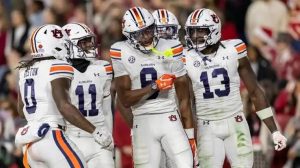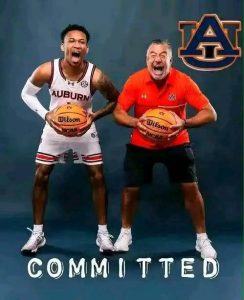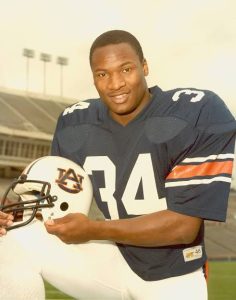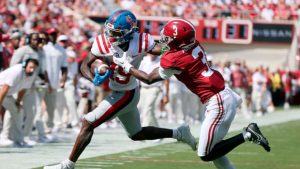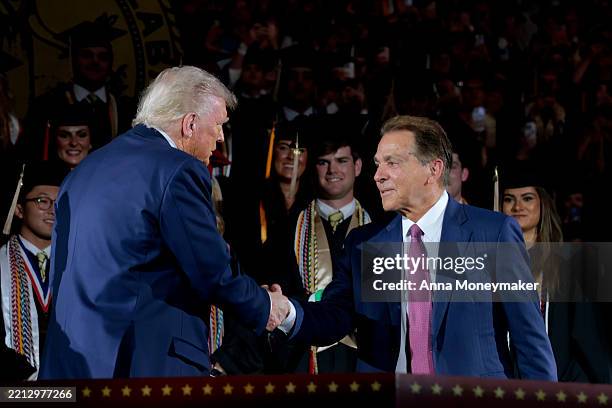
TUSCALOOSA, ALABAMA - MAY 01: U.S. President Donald Trump shakes hands with former Alabama Crimson Tide football coach Nick Saban as Trump takes the stage to address graduating students at Coleman Coliseum at the University of Alabama on May 01, 2025 in Tuscaloosa, Alabama. Trump's remarks come the day before commencement ceremonies. (Photo by Anna Moneymaker/Getty Images)
Nick Saban Disagrees with Trump’s Advice: A Clash of Values in Sports and Politics
In an era where sports, politics, and cultural identity have become increasingly intertwined, a high-profile disagreement between former Alabama head coach Nick Saban and former President Donald Trump has sparked national conversation. Known for his legendary career in college football, Saban rarely enters the political arena. But when he does, his words carry weight — especially when they reflect a clear departure from the views of someone as polarizing and powerful as Trump.
The controversy began when Donald Trump, speaking at a campaign rally, criticized what he called the “softening” of sports — particularly college football — and urged coaches to “toughen up these kids” and “put politics aside.” While Trump didn’t mention Saban by name, his comments came just days after Saban voiced support for athletes’ rights to express themselves and emphasized the importance of mental health in today’s game.
Saban, who stepped down from coaching in January 2024 after a historic run at Alabama, was asked about Trump’s remarks during a sports leadership conference in Atlanta. His response was measured but unmistakably pointed.
“I’ve always believed that leadership is about helping people grow — not yelling the loudest. If we’re not listening to the next generation, we’re missing the point. You don’t lead young people by bullying them,” Saban said. “Toughness is important, yes, but so is compassion.”
This isn’t the first time Saban and Trump have found themselves on opposite sides of a cultural fault line. During the 2017 national anthem protests, when many NFL players knelt to bring attention to racial injustice, Trump famously called on owners to fire those players. Saban, while cautious not to politicize his position, allowed and supported his players in expressing themselves and emphasized understanding and empathy over condemnation.
In a 2018 open letter, co-signed with other West Virginia University alumni including NBA legend Jerry West and former NFL commissioner Paul Tagliabue, Saban publicly endorsed Joe Manchin — a Democrat — and supported the freedom of athletes to speak out on social issues. While he stopped short of endorsing any presidential candidate, his values were clear: respect for diversity, mental well-being, and social progress.
College football has long been a microcosm of American values — especially in the South. From debates over player compensation to how schools responded to the COVID-19 pandemic, every coaching decision seems to carry political weight. Trump’s recent comments play into a broader narrative he has pushed: that traditional American values are being eroded by political correctness and what he calls “wokeness.”
But for Saban, the game has always been about more than just winning. His success at Alabama — where he won seven national championships and turned countless players into NFL stars — was rooted in discipline, accountability, and adaptability. He often spoke of the importance of “the process,” a philosophy of long-term growth that embraces both challenge and support.
“Coaching isn’t just yelling and pushing,” Saban said during the same Atlanta appearance. “It’s about building relationships, understanding what motivates people, and being there when things get hard.”
One of the key areas of disagreement between Saban and Trump centers on mental health. While Trump has often dismissed mental health initiatives in sports as signs of weakness, Saban has been vocal in recent years about the psychological pressures athletes face. Under his leadership, Alabama invested in mental health professionals and emphasized mental training as much as physical conditioning.
“The pressure on these kids is immense,” Saban said in a 2022 interview. “If you don’t give them tools to deal with that — not just as players, but as human beings — you’re failing them.”
That holistic view of coaching clashes with Trump’s vision of toughness and tradition. Where Trump sees modern changes in sports as erosion, Saban sees evolution. Where Trump speaks of dominance, Saban talks of development.
The disagreement between Trump and Saban isn’t just personal — it’s symbolic. It represents two divergent views of what sports should be in America. On one side, Trump and his supporters see athletics as a bastion of rugged individualism, patriotic symbolism, and strict hierarchy. On the other, Saban and a growing number of coaches see sports as a platform for leadership, empathy, and social change.
This tension reflects broader cultural divides. As Gen Z athletes bring new priorities — from social justice to work-life balance — into locker rooms, the “old school” approach that once defined sports is being challenged. And coaches who refuse to evolve are finding it harder to connect with players, win games, or recruit talent.
Saban’s enduring legacy might not be just about championships, but about how he navigated this generational shift — adapting without compromising excellence.
Reactions to the Saban-Trump rift have predictably fallen along partisan lines. Conservative commentators have criticized Saban for “coddling” athletes, while others have praised him for taking a stand rooted in integrity. Social media lit up with hashtags like #StandWithSaban and #FootballNotPolitics, showing how even football discourse can turn tribal.
But some observers argue that the disagreement is being blown out of proportion.
“Nick Saban is not a political figure, and Donald Trump is not a football coach,” said ESPN analyst Paul Finebaum. “But when either of them speaks, people listen. That’s why this matters.”
It remains to be seen whether Saban’s stance will have a ripple effect beyond sports. With his post-coaching career including media appearances, philanthropy, and speaking engagements, he’s emerging as an elder statesman — not just of football, but of leadership itself.
The disagreement between Nick Saban and Donald Trump may not be a feud in the traditional sense. There’s no shouting match, no name-calling. But the ideological rift between them could not be clearer.
Trump’s worldview thrives on confrontation, dominance, and nostalgia for a bygone era. Saban’s leadership, by contrast, emphasizes growth, understanding, and meeting people where they are. In many ways, this contrast defines the choice facing not just athletes and coaches, but the country as a whole.
As college sports continue to evolve — with NIL deals, transfer portals, and growing attention to mental health — the voices shaping the narrative will matter more than ever. Nick Saban may be retired from the sidelines, but his voice still echoes through the locker rooms, boardrooms, and now, political arenas of America.
In disagreeing with Trump’s advice, Saban didn’t just push back on politics. He affirmed a philosophy of leadership that values more than just toughness — one that sees players not as pawns, but as people.

